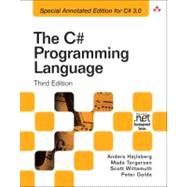
| Foreword | p. xi |
| Preface | p. xiii |
| About the Authors | p. xv |
| About the Annotators | p. xvii |
| Introduction | p. 1 |
| Hello, World | p. 2 |
| Program Structure | p. 4 |
| Types and Variables | p. 6 |
| Expressions | p. 10 |
| Statements | p. 13 |
| Classes and Objects | p. 18 |
| Structs | p. 41 |
| Arrays | p. 43 |
| Interfaces | p. 46 |
| Enums | p. 48 |
| Delegates | p. 49 |
| Attributes | p. 53 |
| Lexical Structure | p. 55 |
| Programs | p. 55 |
| Grammars | p. 55 |
| Lexical Analysis | p. 57 |
| Tokens | p. 61 |
| Preprocessing Directives | p. 74 |
| Basic Concepts | p. 87 |
| Application Start-Up | p. 87 |
| Application Termination | p. 88 |
| Declarations | p. 89 |
| Members | p. 92 |
| Member Access | p. 95 |
| Signatures and Overloading | p. 104 |
| Scopes | p. 106 |
| Namespace and Type Names | p. 112 |
| Automatic Memory Management | p. 116 |
| Execution Order | p. 121 |
| Types | p. 123 |
| Value Types | p. 124 |
| Reference Types | p. 135 |
| Boxing and Unboxing | p. 137 |
| Constructed Types | p. 141 |
| Type Parameters | p. 145 |
| Expression Tree Types | p. 146 |
| Variables | p. 149 |
| Variable Categories | p. 149 |
| Default Values | p. 154 |
| Definite Assignment | p. 155 |
| Variable References | p. 171 |
| Atomicity of Variable References | p. 172 |
| Conversions | p. 173 |
| Implicit Conversions | p. 174 |
| Explicit Conversions | p. 180 |
| Standard Conversions | p. 188 |
| User-Defined Conversions | p. 188 |
| Anonymous Function Conversions | p. 193 |
| Method Group Conversions | p. 200 |
| Expressions | p. 203 |
| Expression Classifications | p. 203 |
| Operators | p. 206 |
| Member Lookup | p. 214 |
| Function Members | p. 217 |
| Primary Expressions | p. 238 |
| Unary Operators | p. 280 |
| Arithmetic Operators | p. 285 |
| Shift Operators | p. 295 |
| Relational and Type-Testing Operators | p. 297 |
| Logical Operators | p. 307 |
| Conditional Logical Operators | p. 309 |
| The Null Coalescing Operator | p. 311 |
| Conditional Operator | p. 313 |
| Anonymous Function Expressions | p. 314 |
| Query Expressions | p. 324 |
| Assignment Operators | p. 339 |
| Expressions | p. 344 |
| Table of Contents provided by Publisher. All Rights Reserved. |
The New copy of this book will include any supplemental materials advertised. Please check the title of the book to determine if it should include any access cards, study guides, lab manuals, CDs, etc.
The Used, Rental and eBook copies of this book are not guaranteed to include any supplemental materials. Typically, only the book itself is included. This is true even if the title states it includes any access cards, study guides, lab manuals, CDs, etc.